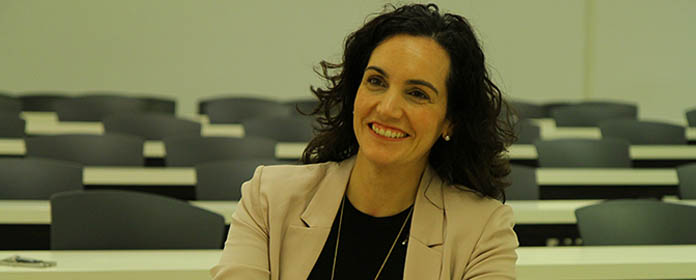News
LATEST NEWS AND EVENTS FROM THE SCHOOL OF ENGINEERING
Paloma Grau: "Water is a factor of social and economic growth".
On the occasion of World Water Day, the professor of industrial processes at Tecnun, says that conventional solutions based on the transfer of drinking water from one region to another are no longer sufficient.

World Water Day is celebrated on March 22nd and, to celebrate this event, we reproduce the article published today in THE BASQUE NEWSPAPER by the professor of industrial processes of Tecnun, Paloma Grau.
World Water Day has been celebrated every March 22 since 1992. This resource, necessary for life and present on Earth since its origin in the same quantity as now, has been a factor of social and economic growth. But it has also been source of numerous conflicts throughout history. In 2010, the General Assembly of the General Assembly of the United Nations explicitly recognized the human right to water and sanitation, reaffirming that "clean drinking water and sanitation are essential for the realization of all human rights." Even today, 17% of the world's population does not have access to safe drinking water and about 40% does not have adequate sanitation systems, with consequent health problems. In many developing countries development, women spend more than eight hours a day on water-related tasks, such as catchment, storage and treatment, which significantly reduces the time they should spend on Education and their involvement in social life.
However, despite currenttechnological developments, wastewater management and treatment remains a major challenge challenge, aggravated in recent decades mainly by three causes. Firstly, because of the growth of the world population, which leads to an increase in agricultural production, urbanization and industrialization.
During the second half of the last 20th century, water use in industry and for human consumption has quadrupled and has now reached 22% and 8% respectively of existing water reserves. This increased water consumption has not only led to a decrease in reserves, but also to the appearance of a significant amount of wastewater with different types of pollution, the treatment of which involves significant consumption of energy and resources.
A second cause is the aging of the infrastructure for transporting and managing water in distribution systems or collectors. With current installations, which are already obsolete in many cases, water is lost in the distribution systems due to leaks, which also lead to a significant loss of energy. Lastly, it is worth mentioning written request, climate change, which makes our planet more vulnerable. We are currently exposed to periods of floods or droughts, desertification of some regions and greater uncertainty in access to drinking water.

In view of this status, water professionals - scientists, engineers and economists, among others - must address new challenges in the collection, management and treatment of this resource resource. Conventional solutions based on the transfer of drinking water from one region to another are no longer sufficient. Currently, environmental engineering, biotechnology and information and communication technologies (ICTs) can provide solutions that enable its sustainable use and even the obtaining of new resources within a model of Economics circular. For example, an urban or industrial wastewater could be conceived as a source of resources such as reusable water for irrigation or industrial uses, high added value products such as fertilizers, substitute products for petroleum derivatives such as bioplastics, energy in the form of biogas, etc.
This paradigm shift "from waste to resource" implies the development of new technologies based, in many cases, on the activity of microorganisms and enzymes capable of processing polluting compounds and transforming them into energy, biomass and other products of interest. ICTs, in the context of Industry 4.0, can also contribute to reducing water consumption through the use of information systems that enable more efficient management.
Finally, greater social awareness is needed through training programs that encourage public entities and citizens to conserve and improve their use. The technological solutions mentioned above, although positive, will not be sufficient if, in parallel, work is not done on this "social engineering".
On this World Water Day, I would like to take this opportunity to congratulate in a special way all those people who, from different fields, dedicate our professional lives to something so vital. Personally, I consider it a privilege to know that my work contributes in such a direct way to leaving a better world for our children.
